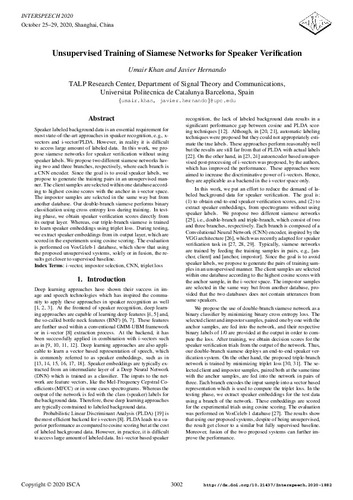Mostra el registre d'ítem simple
Unsupervised training of siamese networks for speaker verification
| dc.contributor.author | Khan, Umair |
| dc.contributor.author | Hernando Pericás, Francisco Javier |
| dc.contributor.other | Universitat Politècnica de Catalunya. Doctorat en Teoria del Senyal i Comunicacions |
| dc.contributor.other | Universitat Politècnica de Catalunya. Departament de Teoria del Senyal i Comunicacions |
| dc.date.accessioned | 2020-11-12T17:06:10Z |
| dc.date.available | 2020-11-12T17:06:10Z |
| dc.date.issued | 2020 |
| dc.identifier.citation | Khan, U.; Hernando, J. Unsupervised training of siamese networks for speaker verification. A: Annual Conference of the International Speech Communication Association. "Interspeech 2020: the 20th Annual Conference of the International Speech Communication Association: 25-29 October 2020: Shanghai, China". Baixas: International Speech Communication Association (ISCA), 2020, p. 3002-3006. ISBN 1990-9772. DOI 10.21437/Interspeech.2020-1882. |
| dc.identifier.isbn | 1990-9772 |
| dc.identifier.uri | http://hdl.handle.net/2117/332092 |
| dc.description.abstract | Speaker labeled background data is an essential requirement for most state-of-the-art approaches in speaker recognition, e.g., xvectors and i-vector/PLDA. However, in reality it is difficult to access large amount of labeled data. In this work, we propose siamese networks for speaker verification without using speaker labels. We propose two different siamese networks having two and three branches, respectively, where each branch is a CNN encoder. Since the goal is to avoid speaker labels, we propose to generate the training pairs in an unsupervised manner. The client samples are selected within one database according to highest cosine scores with the anchor in i-vector space. The impostor samples are selected in the same way but from another database. Our double-branch siamese performs binary classification using cross entropy loss during training. In testing phase, we obtain speaker verification scores directly from its output layer. Whereas, our triple-branch siamese is trained to learn speaker embeddings using triplet loss. During testing, we extract speaker embeddings from its output layer, which are scored in the experiments using cosine scoring. The evaluation is performed on VoxCeleb-1 database, which show that using the proposed unsupervised systems, solely or in fusion, the results get closer to supervised baseline |
| dc.description.sponsorship | This work has been developed in the framework of DeepVoice Project (TEC2015-69266-P), funded by Spanish Ministry |
| dc.format.extent | 5 p. |
| dc.language.iso | eng |
| dc.publisher | International Speech Communication Association (ISCA) |
| dc.subject | Àrees temàtiques de la UPC::Enginyeria de la telecomunicació::Processament del senyal::Processament de la parla i del senyal acústic |
| dc.subject.lcsh | Automatic speech recognition |
| dc.subject.other | i-vector |
| dc.subject.other | Impostor selection |
| dc.subject.other | CNN |
| dc.subject.other | Triplet loss |
| dc.title | Unsupervised training of siamese networks for speaker verification |
| dc.type | Conference report |
| dc.subject.lemac | Reconeixement automàtic de la parla |
| dc.contributor.group | Universitat Politècnica de Catalunya. VEU - Grup de Tractament de la Parla |
| dc.identifier.doi | 10.21437/Interspeech.2020-1882 |
| dc.description.peerreviewed | Peer Reviewed |
| dc.relation.publisherversion | http://dx.doi.org/10.21437/Interspeech.2020-1882 |
| dc.rights.access | Open Access |
| local.identifier.drac | 29753620 |
| dc.description.version | Postprint (published version) |
| dc.relation.projectid | info:eu-repo/grantAgreement/MINECO//TEC2015-69266-P/ES/TECNOLOGIAS DE APRENDIZAJE PROFUNDO APLICADAS AL PROCESADO DE VOZ Y AUDIO/ |
| local.citation.author | Khan, U.; Hernando, J. |
| local.citation.contributor | Annual Conference of the International Speech Communication Association |
| local.citation.pubplace | Baixas |
| local.citation.publicationName | Interspeech 2020: the 20th Annual Conference of the International Speech Communication Association: 25-29 October 2020: Shanghai, China |
| local.citation.startingPage | 3002 |
| local.citation.endingPage | 3006 |


